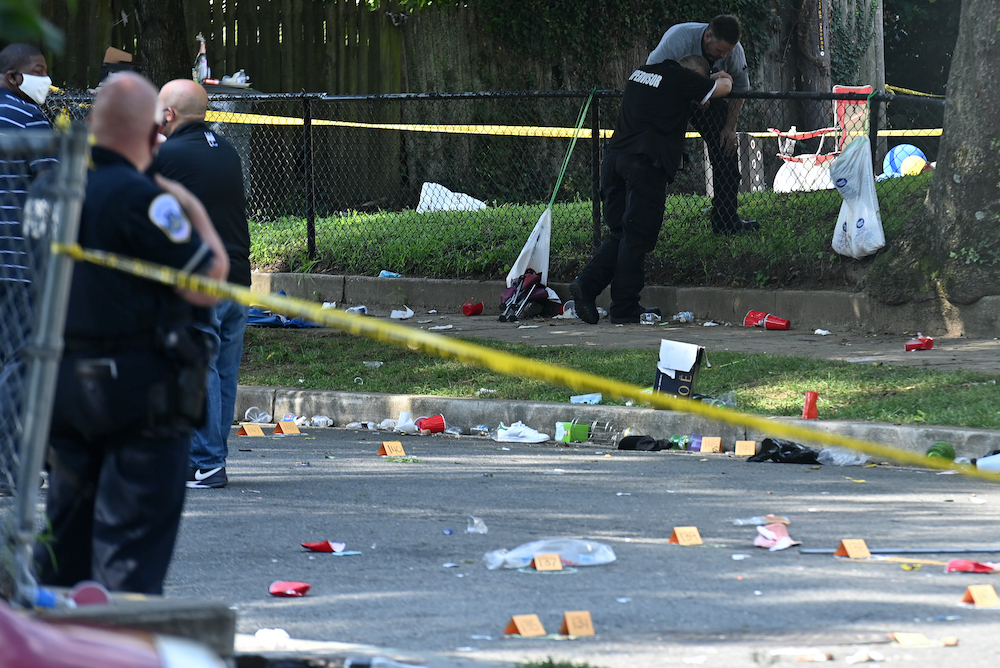What To Know Today
Pandemic a “perfect storm” for gun violence, leading expert says. But there is hope. Shani Buggs, an assistant professor at the University of California, Davis, has been studying gun violence prevention as a public health issue since 2012, when it “was still very much still a fringe idea,” she says in a must-read interview with Greg Berman of the Henry Frank Guggenheim Foundation. Buggs said spikes in gun violence during the pandemic were especially pronounced in places that had previously seen elevated rates of violence and the negative social factors that tend to accompany it: high rates of unemployment, poverty, and criminal justice contact, as well as housing and food insecurity. She said the pandemic injected fear, anxiety, and frustration into communities of color in particular and frayed economic opportunities and social supports like violence intervention strategies. Her “glimmers of hope”: Buggs notes that “for the first time, we will have large-scale investments at the federal level into communities, specifically for violence prevention that doesn’t look like more law enforcement.”
Another brutal weekend of mass shootings leaves scores injured. There were nine incidents with four or more victims from Friday evening through Sunday, which together left 11 people dead and 50 others injured, according to the Gun Violence Archive. They include:
- In Austin, Texas, where 14 people were shot when gunmen fired into a crowd on a popular strip around 1:30 a.m. Saturday. A tourist in town from New York has died, Austin police confirmed Sunday to the Austin American-Statesman.
- In Chicago, where nine people were injured and one died after two men fired on a group of people in the Chatham neighborhood around 2 a.m. Saturday, according to local media reports. ‘”Mayhem, mayhem,” said a local pastor.
- In Savannah, Georgia, where seven people were injured and one died at the second shooting at the same apartment complex within the same week. “Obviously, we are absolutely devastated. We’re disgusted,” Savannah Mayor Van Johnson told WTOC-TV.
Nancy Pelosi on background checks: “We are not going away until we can get legislation passed.” In an exclusive CNN interview on Sunday morning, the House Speaker — draped in orange to honor gun violence prevention efforts — said Congress would keep fighting for background check legislation despite efforts stalling in the Senate thus far: “Will that cover everything? No, but it [the background check system] goes a very long way, and it prevented millions of gun purchases not to happen up until now. Now we have to expand it to include internet sales and gun shows and the rest.” The House has already passed a universal background check bill, but the legislation has failed to gain traction in the narrowly divided Senate. Meanwhile, a less-expansive bipartisan effort in the upper chamber — requiring more private sellers to run background checks on would-be buyers — came to a halt last week.
Reactions to the police after George Floyd protests largely split along racial, political lines. That’s according to researchers at Washington University in St. Louis and the University of California, Riverside, who tried to determine whether the months of protests changed the dial on American attitudes about police violence. The study, published in the American Political Science Review, found that protests “swiftly decreased” sentiments toward the police and increased belief in anti-Black discrimination among politically liberal Americans in particular. However, attitudes among politically conservative Americans were largely static, suggesting that the protests had an impact largely on those who “were already sympathetic to the Black Lives Matter movement.” And in its analysis by race, the study’s data suggested “that attitudes among white Americans shifted back toward their pre-Floyd baseline means over time.”
Award alert! NPR wins Pulitzer for investigative series on gun rights activists. “No Compromise,” a series about the brothers behind a far-right gun network and a deepening schism on the right, won the award for best audio reporting. The series was produced by NPR and reporters with Guns & America, a two-year-long national reporting collaborative that ended last year.
Data Point
87,000 — number of Americans who died of drug overdoses last year, a 29 percent increase from 2019 and more than twice the number of lives claimed by gun violence in 2020. Some experts are drawing connections from the opioid crisis to the uptick in shootings and homicides across the nation. “Open-air drug markets are the ultimate recipe for violence,” one researcher said. [The Daily Beast]

